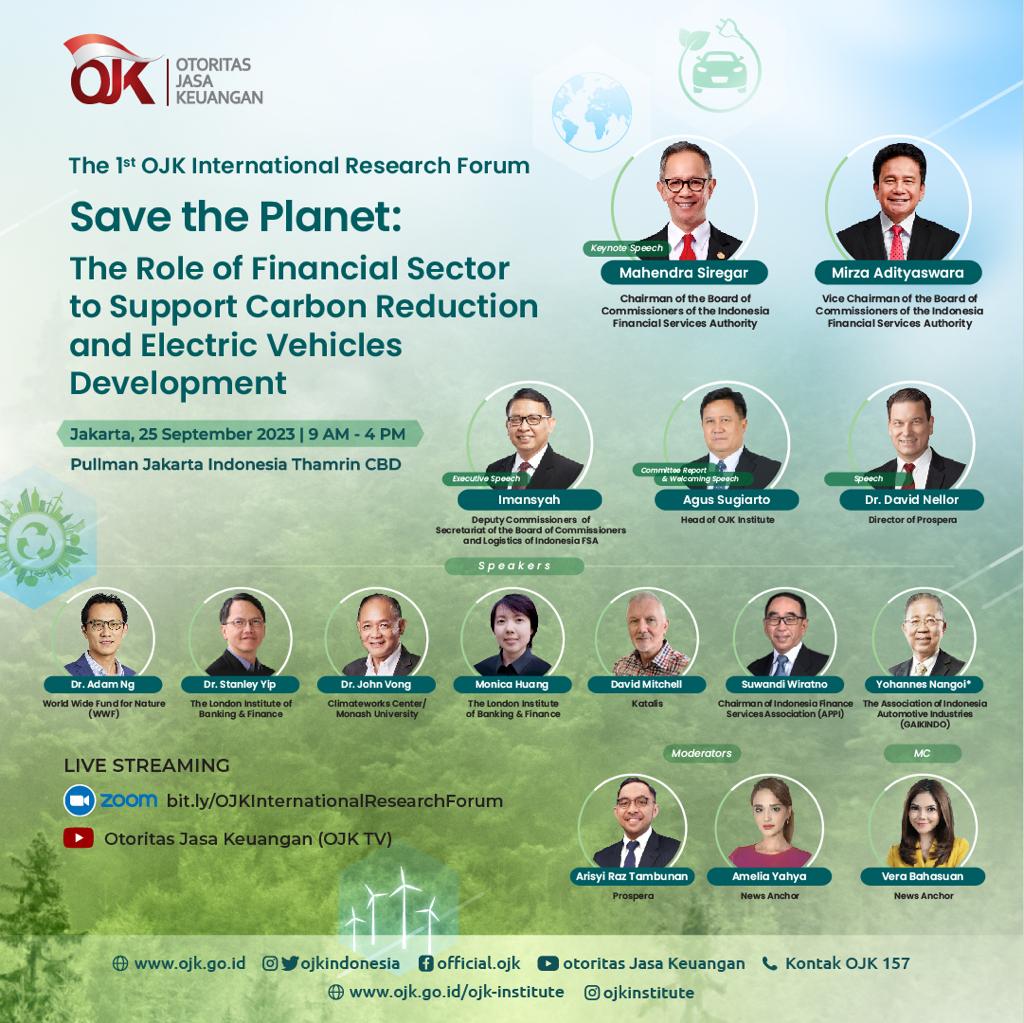OJK International Research Forum, Save the Planet: The Role of Financial Sector to Support Carbon Reduction and Electric Vehicles Development
- 25 September 2023
- Lintas Sektor
- Online

Teaser
Background
Climate change poses a significant global challenge, necessitating urgent and coordinated action to mitigate its impacts (IPCC, 2018). In response, the carbon market and the widespread adoption of electric vehicles (EVs) have emerged as crucial solutions in the global efforts to combat climate change and transition to a low-carbon economy. However, the successful implementation of these solutions relies heavily on the active participation of the financial sector.
The financial sector, with its expertise in capital mobilization, risk management, and innovative financial products, is uniquely positioned to drive the development of the carbon market and support the transition to EVs (Loche et. al, 2019; GFMA & BCG, 2020). Through its involvement, the financial sector can play a transformative role in redirecting investments towards sustainable initiatives and facilitating the necessary infrastructure and financing mechanisms to accelerate the adoption of low-carbon technologies.
The carbon market, encompassing carbon pricing mechanisms and carbon offset trading, aims to put a price on carbon emissions, incentivizing businesses to reduce their greenhouse gas (GHG) emissions (World Bank, 2019). The financial sector's knowledge and experience in financial modeling, risk assessment, and market oversight are instrumental in designing and managing effective carbon pricing mechanisms such as carbon taxes and cap-and-trade systems. These mechanisms create economic incentives for emission reductions and promote a more sustainable and efficient use of resources.
In addition to carbon pricing, the financial sector plays a vital role in the creation and trading of carbon offsets. Financial institutions invest in emission reduction projects and support initiatives such as renewable energy, forestry, and energy efficiency, generating offsets that can be bought and sold in the carbon market. These investments contribute to the development of sustainable projects, encourage emission reductions beyond regulatory requirements, and enable companies to offset their own emissions.
Furthermore, the financial sector enhances the liquidity and efficiency of the carbon market by providing trading platforms, market-making activities, and derivatives instruments (Carbon Pricing Leadership Coalition, n.d.). This involvement facilitates price discovery, improves market transparency, and enables effective risk management. Financial institutions also develop carbon risk hedging products, allowing companies to manage price volatility and plan for long-term carbon liabilities, thereby fostering stability and confidence within the carbon market.
In the realm of electric vehicles, the financial sector plays a critical role in financing the necessary infrastructure. This includes supporting the deployment of charging stations, battery manufacturing facilities, and research and development initiatives. Through project financing, venture capital investments, and public-private partnerships, financial institutions contribute to the expansion of the EV charging network, addressing one of the primary barriers to widespread EV adoption—range anxiety and inadequate infrastructure.
Moreover, financial institutions offer consumer financing options and leasing agreements that make EVs more affordable and accessible to individuals and businesses (Mohan & Gupta, 2019). By providing competitive interest rates, flexible repayment terms, and tailored financing solutions, they encourage a broader consumer base to transition from traditional combustion engine vehicles to EVs. This financial support significantly drives market demand and facilitates the mass adoption of electric vehicles.
In conclusion, the financial sector plays a pivotal role in the carbon market and the transition to electric vehicles. Through its expertise, capital mobilization capabilities, and innovative financial products, the sector can drive sustainable investment, promote emission reductions, and facilitate the development of necessary infrastructure (SIFMA, n.d.). Collaboration between policymakers, businesses, and investors is crucial to leverage the financial sector's potential and harness its transformative power in accelerating the transition to a low-carbon future.
References:
Carbon Pricing Leadership Coalition. (n.d.). The role of financial institutions in carbon markets. Retrieved from https://www.carbonpricingleadership.org/ IPCC. (2018). Global warming of 1.5°C. Retrieved from https://www.ipcc.ch/.
Louche, C., Busch, T., Crifo, P. & Marcus, A. (2019) Financial Markets and the Transition to a Low-Carbon Economy: Challenging the Dominant Logics. Organization & Environment, Vol. 32(1) 3–17. s://doi.org/10.1177/1086026619831516
SIFMA. (n.d.). Sustainable finance: The role of the financial sector. Retrieved from https://www.sifma.org/
World Bank (2023), Carbon Pricing, Retrieved from https://www.worldbank.org/en/programs/pricing-carbon.
World Bank (2023) State and Trends of Carbon Pricing 2023. http://hdl.handle.net/10986/39796 License: CC BY 3.0 IGO.
Objective
The primary objective of this research conference is to facilitate a comprehensive understanding of how the financial sector can play a pivotal role in accelerating the carbon market's growth and facilitating a seamless transition towards widespread EV adoption. By examining emerging trends, innovative strategies, and regulatory frameworks, we aspire to build a robust knowledge base and actionable insights that can shape progressive policies and transformative practices. In addition, the OJK International Research Forum serves as a platform for knowledge exchange, collaboration, and growth for various stakeholders in the financial sector, contributing to the advancement of the industry as a whole.
A. Benefit for Government and Regulators
- Policy Insights: The forum will provide valuable research insights and expert opinions that can aid government agencies and regulators in formulating effective financial policies and regulations.
- Networking: It offers an opportunity for regulators to connect with international experts and counterparts, fostering knowledge exchange and best practices in financial oversight.
- Industry Trends: The forum will highlight emerging trends and challenges in the financial sector, enabling regulators to stay informed and adapt to the changing landscape.
B. Benefit for State-Owned-Enterprises
- Knowledge Sharing: The forum facilitates the exchange of knowledge between state-owned enterprises and other financial institutions, helping them gain insights into the latest industry developments.
- Market Opportunities: It offers a platform for state-owned enterprises to explore potential collaborations and partnerships with international organizations, creating new business opportunities.
- Best Practices: Participants can learn from global case studies and best practices, allowing state-owned enterprises to enhance their financial management and performance.
C. Benefit for Academics
- Networking: The forum provides opportunities to connect with scholars and researchers from different countries, fostering academic collaborations and research partnerships.
- Access to Industry Insights: Academics can learn from practitioners and experts in the financial sector, enriching their understanding of real-world challenges and implications.
D. Benefit for Economic and Business Researchers/Observers
- Data and Information: The forum will offer access to the latest research and data in the financial industry, supporting economic and business researchers in their analyses and studies.
- Diverse Perspectives: It brings together experts and practitioners from various backgrounds, providing diverse perspectives on financial issues and trends.
- Policy Recommendations: Researchers can use the insights from the forum to develop policy recommendations and economic forecasts based on the latest industry insights.
E. Benefit for Practitioners/Entrepreneurs in the Financial Sector
- Professional Development: The forum offers workshops, discussions, and presentations by experts, providing practitioners with opportunities to enhance their skills and knowledge.
- Market Intelligence: Participants can gain valuable market intelligence and stay updated on the latest industry developments, aiding decision-making and strategy formulation.
- Networking and Partnerships: The event facilitates networking with potential partners, investors, and clients, enabling entrepreneurs in the financial sector to expand their business networks.
Participant
Speaker
-
Adam Ng (World Wide Fund for Naturure (WWF))
-
Dr. Stanley Yip (The London Institute of Banking & Finance)
-
Dr. John Vong (Climateworks Center/Monash University)
-
Monica Huang (The London Institute of Banking & Finance)
-
David Mitchell (Katalis/Prospera)
-
Suwandi Wiratno (PT Chandra Sakti Utama Leasing)
-
Yohannes Nangoi (The Association of Indonesia Automotive Industries (GAIKINDO))
-
Mahendra Siregar as Keynote Speech (Chairman of Indonesia Financial Services Authority)

